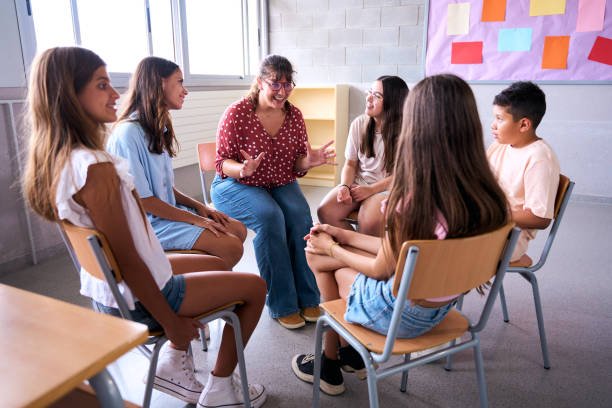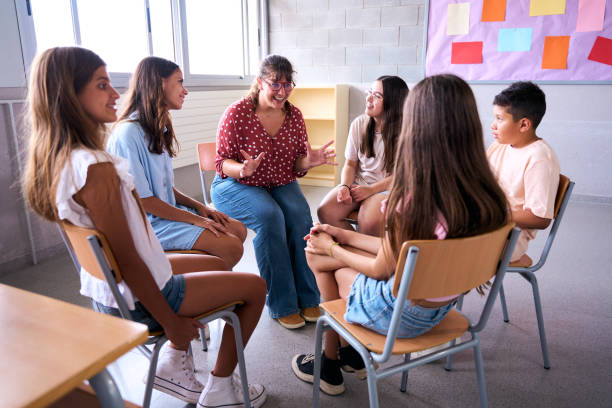
Diverse happy group of primary school children students sitting on chairs in circle interacting during lesson. Pre-adolescents kids talking together to classmates and female teacher in support class
Cultural Sensitivity: A Key to Unlocking Potential in Gifted Youth Coaching
Gifted youth often face unique challenges that can leave them feeling misunderstood and overwhelmed. Picture a coaching environment where cultural sensitivity acts as a bridge, connecting diverse backgrounds and fostering emotional intelligence. This isn’t just a dream—it’s the key to unlocking the full potential of gifted youth. You’ll discover strategies that empower coaches, parents, and educators to create inclusive spaces where every child feels seen and supported. Are you ready to transform the way you support gifted teens? Let’s dive in.
Embracing Cultural Sensitivity

Embracing cultural sensitivity in gifted youth coaching allows for a deeper understanding of each individual’s unique background. This understanding fosters an inclusive environment where emotional intelligence can thrive. Let’s break down the key components that make cultural sensitivity a cornerstone in effective coaching practices.
Understanding Diverse Backgrounds
Gifted youth come from a myriad of cultural backgrounds, each with its own set of values and experiences. Understanding these diverse backgrounds is crucial to creating a supportive coaching environment. Coaches must be aware of the cultural nuances that may influence a child’s behavior and learning style. Cultural awareness not only enhances communication but also builds trust between the coach and the youth.
Real-world examples demonstrate the importance of cultural sensitivity. For instance, a coach working with a youth from a collectivist culture might need to recognize the family unit’s role in decision-making. This awareness can significantly improve the coaching dynamic.
Key insights include:
Acknowledging cultural differences in communication styles.
Recognizing cultural values that shape a youth’s worldview.
Developing customized coaching strategies that respect these differences.
For further reading on cultural awareness, visit Empower World.
Building Emotional Intelligence
Emotional intelligence plays a vital role in coaching gifted youth. It involves recognizing and managing one’s emotions and understanding others’ feelings. This skill is essential for gifted teens who often experience emotions more intensely than their peers.
By fostering emotional intelligence, coaches can help gifted youth better navigate social interactions and personal challenges. This process includes teaching youth how to express their feelings constructively and empathize with others.
Building emotional intelligence involves several steps:
Encourage self-reflection to identify emotions.
Teach active listening to improve empathy.
Promote problem-solving skills for emotional regulation.
For more insights on culturally responsive practices that enhance emotional intelligence, check out this resource.
Strategies for Inclusive Coaching

Inclusive coaching is about creating environments where every gifted youth feels valued and understood. It involves specific strategies that foster open communication and safe spaces, essential for the growth of emotional intelligence.
Creating Safe Spaces
Creating a safe space is fundamental in gifted youth coaching. This environment allows them to explore their identity and express their thoughts without fear of judgment. A safe space fosters trust and encourages open dialogue.
Coaches can create safe spaces by:
Setting clear boundaries and expectations.
Encouraging respect and understanding among peers.
Being approachable and empathetic to the youth’s concerns.
An example of a safe space includes a classroom where diversity is celebrated, and students are encouraged to share their cultural experiences. This practice not only enriches the learning environment but also enhances emotional growth.
For more on enhancing coaching impact, visit LinkedIn.
Encouraging Open Communication
Open communication is a cornerstone of effective coaching. It involves being transparent, approachable, and receptive to feedback. Encouraging open communication helps gifted youth feel heard and understood.
To promote open communication:
Encourage active listening and validate the youth’s feelings.
Provide regular feedback that is constructive and supportive.
Foster a culture of mutual respect and dialogue.
These practices help build a solid foundation for personal growth and emotional resilience. Open communication ensures that gifted youth can express their ideas freely, contributing to a more inclusive coaching experience.
Empowering Gifted Youth and Families

Empowering gifted youth and their families is essential for fostering emotional growth and overcoming common challenges such as anxiety and perfectionism. By providing the right support and tools, coaches can help youth navigate these issues effectively.
Supporting Emotional Growth
Supporting emotional growth in gifted youth involves nurturing their ability to understand and manage their emotions. Coaches can play a significant role in this process by providing a supportive environment and practical tools.
Strategies to support emotional growth include:
Encouraging mindfulness practices to enhance self-awareness.
Teaching coping strategies to manage stress and anxiety.
Promoting positive self-talk to build confidence.
A case study shows that integrating mindfulness in coaching led to significant improvements in emotional regulation and resilience among gifted teens. Key takeaways include the importance of consistent practice and a supportive community.
Discover more on supporting emotional development in gifted youth in this academic journal.
Tools for Overcoming Anxiety and Perfectionism
Gifted youth often grapple with anxiety and perfectionism, which can hinder their emotional well-being and academic performance. Providing tools to overcome these challenges is vital.
Actionable advice for overcoming anxiety and perfectionism:
Practice relaxation techniques such as deep breathing.
Set realistic goals and celebrate small achievements.
Encourage an attitude of self-compassion and learning from mistakes.
Real-world examples illustrate the effectiveness of these tools. One youth, struggling with perfectionism, found relief through regular mindfulness practice and setting achievable goals. These changes led to increased self-esteem and reduced anxiety levels.
For more strategies and resources, explore our workshops on building cultural competence in coaching.

A certified Heal Your Life® Coach with 20+ years in education and emotional development. Supports gifted teens in navigating anxiety, perfectionism, and identity challenges, while equipping parents with practical tools for lasting transformation. Sessions blend emotional healing, mindset mastery, and strategic empowerment.



